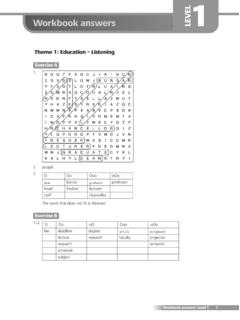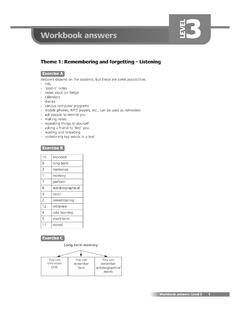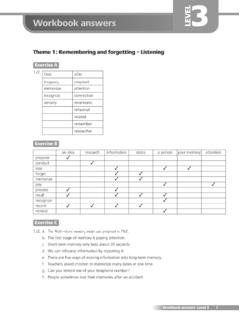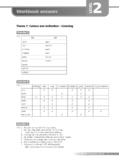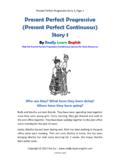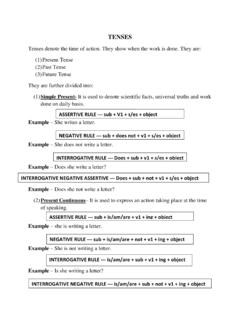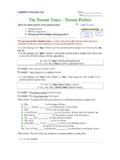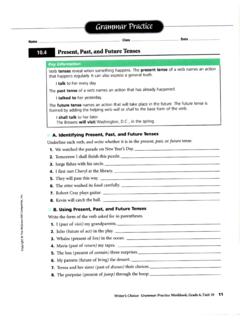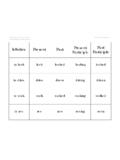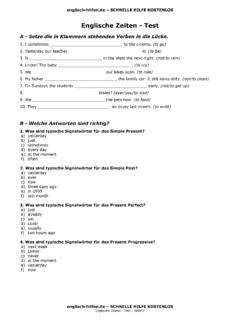Transcription of Do you need English in your studies? Progressive …
1 NEW EDITIONP rogressive Skills in English Level 3 Teacher s BookTerry Phillips and Anna PhillipsGARNET EDUCATIONS killsPROGRESSIVEin EnglishTerry Phillips and Anna PhillipsLevel 3 Teacher s BookDo you need English in your studies? Then you need theProgressive Skills in English CourseThe course builds the skills required for lectures, tutorials, reading research and written assignments in Common European Flesch-Kincaid Level for Level Framework Level Listening and Reading B2 Listening: 7 8(max. 800 words) Reading: 7 8(max. 500 words) Output writing texts:short essays and reportsListening skills include: recording sources recognizing the main points understanding signpost language identifying and recording units of measurement choosing the best form for notesSpeaking skills include: preparing for a talk starting and ending an extended turn reporting problems with research reacting to tutorial contributions talking about processesReading skills include: recognizing sentence function reading line graphs distinguishing between fact and theory understanding non-text markers recognizing the writer s point of view or biasWriting skills include: writing argument essays writing research reports writing for and against essays writing discussion essays writing persuasive essaysLevel 3 Course components: Course Book with audio DVD.
2 978-1-78260-305-4 Workbook with audio DVD.. 978-1-78260-308-5 Teacher s Book.. PROG SKILLS 1 17/07/2017 10:25 Page 1 1 NEW EDITIONS killsPROGRESSIVEin EnglishTerry Phillips and Anna PhillipsLevel 3 Teacher s BookAOU PROG SKILLS 1 17/07/2017 10:26 Page 1 Published byGarnet Publishing Southern CourtSouth StreetReading RG1 4QS, UKCopyright Terry Phillips and Anna Phillips right of Terry Phillips and Anna Phillips to be identified as the authors of this work has been asserted by them in accordance with the Copyright,Designs and Patents Act rights part of this publication may be reproduced, stored in a retrieval system, or transmitted in any form or by any means, electronic, mechanical,photocopying, recording or otherwise, without the prior permission of thePublisher.
3 Any person who does any unauthorized act in relation to thispublication may be liable to criminal prosecution and civil claims for edition 2017 ISBN: 978-1-78260-311-5 British Library Cataloguing-in-Publication DataA catalogue record for this book is available from the British managers: Richard Peacock, Nicky PlattEditorial team: Dr Sally Rabi, Emily McIntyre, Sarah Mellowes, Richard Peacock, Nicky Platt, Rod WebbResearch:Lucy PhillipsDesign:Ed Du Bois, Mike HinksTypesetting:Sarah Church, Bob HousePhotography: iStockphoto, ShutterstockAudio:EFS Television Production Publishers would like to thank the following who contributed to thepiloting of the Garnet series at AOU1. FLS Deanship:Professor Ahmad Y. Majdoubeh and Professor Saleh Al-Salman2. Egypt Branch:Dr Heba Badreldin, Dr Manar Shalaby, Ms Amira Fouad, and Dr Marine Lebanon Branch:Dr Hayat Al-Khatib, Mr Ralph Sleiman, Ms Mirna Abdel Malak, and Ms Helen ZadourianPrinted and boundin Lebanon by International Press: PROG SKILLS 1 17/07/2017 10:26 Page 2 Book map 4 Introduction 6 Theme 1 Remembering and forgetting 21 Theme 2 Friends and family 71 Theme 3 Managing to be successful 117 Theme 4 The media 169 Theme 5 Customs.
4 Origins and effects 201 Word list 256 ContentsAOU PROG SKILLS 1 17/07/2017 10:26 Page 3 ThemeTopics & VocabularyListeningSpeaking1 Remembering andforgetting Memory Learner styles Improving your memory Rehearsal and promptsSkills: recording sources understanding indirectquestionsGrammar: indirect questions verb patterns: forget,remember, remind, learn infinitives Skills: preparing for a talk giving a talkGrammar: should/shouldn tandcould/couldn t 2 Friends and family Making and keepingfriends Apologizing Parents, adults andchildren Decisions in familiesSkills: recognizing the mainpoints of a lecture ortutorialGrammar: intransitive andtransitive verbs prepositional verbsSkills: starting and ending a turn reporting problems introducing statementsGrammar: uses of that reported speech,including past perfect3 Managing to besuccessful Managing time and self The time thieves Decisions, decisions,decisions For and againstSkills: recognizing lecturestructure: signpostwords and phrasesGrammar: verb + infinitive with to verb patterns: verb +object + to do verb + ~ingSkills: reacting to contributors agreeing and disagreeingGrammar: tense agreement inshort responses4 The media The media and theaudience Uses of media Reading the media Social media Skills: restatementGrammar: replacement subjectIt:to indicate certainty.
5 Toindicate stance Skills: explaining specialisttermsGrammar: omitting items inrepeated structures 5 Customs: Origins and effects Cultural diversity Wedding customs The price of happiness Cultural change Skills: making good lecturenotesGrammar: adjective endings understanding extrainformation about theobject/complement understanding extrainformation about thesubjectSkills: checking, explaining,asking to wait talking about pastbeliefs, habits, customsand routinesGrammar: used to/didn t use to wouldor had?Book map 4 Book mapAOU PROG SKILLS 1 17/07/2017 10:26 Page 4 ReadingWritingPhonologyEveryday EnglishPortfolioSkills: recognizing sentencefunction reading line graphsGrammar: the complex nounphrase Skills: writing argument essays writing thesisstatementsGrammar: SVO and SVC (revision) vowel sounds(revision)Making friendsMemoriesSkills: distinguishing betweenfact and theory statements of theoryGrammar: leading prepositionalphrases Skills: designing a survey form writing research reports writing topic sentencesGrammar: permission andobligation with infinitve passives with allow,expect normal stressin two-syllablewords: nouns,adjectives,verbs ApologizingRelationshipsSkills: understanding non-textmarkersGrammar: identifying missingsubjects and verbs afterconjunctionsSkills.
6 Writing for and againstessays comparing withadjectives and nouns describing trendsGrammar: describing trends withpresent continuous andpresent perfect past simple vs presentperfect stress in multi-syllable wordsInterruptionsSelf-managementSkills: doing web researchGrammar: information afterwhich/that Skills: writing persuasiveessays giving supportingstatementsGrammar: complex sentences unstressedsyllables commonintonationpatternsMakingarrangemen tsSocial media and timewastingSkills: recognizing the writer spoint of viewGrammar: conditionals: zero andfirst (revision); secondconditional Skills: writing discussion essaysGrammar: long subject nounphrases alsowith mixed tenses consonantclustersSuggesting andresponding tosuggestionsDeveloping cultures Book map 5 AOU PROG SKILLS 1 17/07/2017 10:26 Page 56 IntroductionThe series7 The themes7 The sections7 The lessons7 Additional pages7 Everyday English7 Knowledge quiz7 Portfolio8 Approach8 Aims8 Moving from teaching general to academic English8 Discrete skills or integrated?
7 8 Receptive skills listening and reading8 Productive skills speaking and writing 9 Syntactic grammar for EAP9 Syntactic grammar at Level 310 Exercise naming11 Exercise types11 Vocabulary boxes12 Skills Checks12 Pronunciation Checks12 Recurrent activities13 Activating (background) knowledge / ideas13 Understanding words in context13 Transferring information (to the real world) / Using new skills in a real-world task13 Reviewing key words13 Identifying a new skill13 Predicting content13 Previewing vocabulary13 Hearing / Understanding / Studying a model / discourse structure13 Practising a model13 Producing a model13 Producing key patterns13 Showing comprehension13 Researching information13 Developing vocabulary13 Developing independent learning13 Developing critical thinking13 Remembering real-world knowledge13 Using / Applying a key skill13 Making and checking hypotheses13 Methodology14 Everyday English14 Knowledge / Vocabulary quiz14 Portfolio15 Listening16 Further speaking practice / drilling17 Setting up tasks17 Use of visuals17 Pronunciation17 Comparing answers in pairs18 Monitoring18 Feedback18 Confirmation and correction18 Highlighting grammar18 Self-checking18 Gap fill18 Two-column activities19 Ordering19 Tables and charts19 Error
8 Correction19 Introduction: Contents AOU PROG SKILLS 1 17/07/2017 10:26 Page 6 Introduction 7 Introduction The seriesThis course is part of the multi-level Progressive Skillsin Englishseries. The series as a whole preparesstudents to study wholly or partly in English medium at tertiary level, or to join the world of academicEnglish, on the internet and in new edition has been extensively revised to takeinto account feedback from both teachers andstudents. The accompanying Workbook providesfurther practice in all the skills themesIn each level of Progressive Skills in English there arefive themes, covering a wide range of areas of humanknowledge. Level 3 Theme 1: Remembering and forgettingTheme 2: Friends and familyTheme 3: Managing to be succesfulTheme 4: The mediaTheme 5: Customs: Origins and effectsThe sectionsWithin each theme there are four main sections, eachdealing with a discrete skill: listening, speaking,reading or writing.
9 A number of related topics areexplored within each theme. For example, in Theme 5the following areas are explored:Listening: cultural diversitySpeaking: wedding customsReading: the price of happinessWriting: cultural changeThe focus in each section is ononespecific skill. TheMethodology notes in the lessons stress the discreteskills focus and caution against spending too much timeon, for example, speaking in a listening section. This isnot because the writers dislike integrated skills. Indeed,each theme ends with a section called Portfolio, whichprovides detailed guidance on integrated skills activitiesfollowing the completion of a particular theme. Theinsistence on the target skill is because the writersbelieve that both the teacher and the students shouldfocus on improvement in a specific skill in a particularlesson, rather than moving constantly between differentskills.
10 However, the key word here is focus. More thanone skill will, of course, be involved in any particularlesson. For example, in listening lessons there is almostalways a speaking output, and in writing lessons there isalmost always a reading commonality of theme across the four skillsections means that, by the end of a theme, studentshave a much deeper knowledge of both theinformation and vocabulary that it comprises than is normally achieved in ELT course lessonsEach skill section contains two or four main lessons,and each lesson has a clear focus and pagesEvery theme contains three additional pages:Everyday EnglishThis page is in the speaking section and builds skills insurvival language and social English . In Theme 1, forexample, this page covers Making friendsand inTheme 2, Apologizing. See the Methodologysectionfor more quizThis page is in the reading section and tests studentson their acquisition of common core knowledge andthematic vocabulary from the theme.

